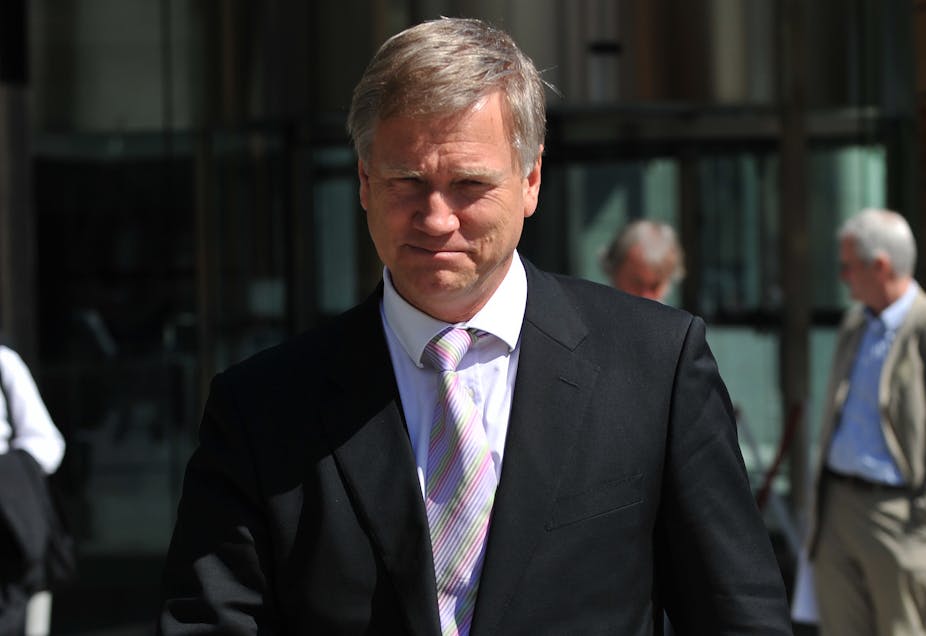It was the ultimate irony. On this week’s Q&A, host Tony Jones issued an apology on behalf of both Indigenous academic Marcia Langton and the ABC for Langton implying on the previous week’s program that News Corp columnist Andrew Bolt was a racist.
This is despite Bolt’s very personal attacks on fair-skinned Aborigines, which led to his successful prosecution under Section 18C of the Racial Discrimination Act in 2011. This is a section that his friends in government, including prime minister Tony Abbott, have pledged to repeal.
It is possible that Bolt would have recourse to the laws of defamation even without the existence of the Racial Discrimination Act. But his actions in demanding an apology did make rather hollow the constant refrain from the right that they believe in untrammelled free speech and the importance of countering such attacks through discussion rather than the courts.
There is considerable debate about the plans to repeal or amend Section 18C, all of which have revolved around arguments about whether or not it is reasonable to deny freedom to “hate speech”. As Race Discrimination Commissioner Tim Soutphommasane has pointed out:
The words of the act say that something is unlawful if it is “reasonably likely, in all the circumstances, to offend, insult, humiliate or intimidate” another person or group of persons on the grounds of race.
Even one of Abbott’s own backbenchers, Indigenous MP Ken Wyatt, has argued that the law protects indigenous and other minority groups against hatred that can easily escalate beyond mere words. Wyatt has reportedly threatened to cross the floor to vote against the proposed changes, which have not yet been released.
The rhetoric of attorney-general George Brandis and newly appointed Human Rights Commissioner Tim Wilson suggests that freedom of speech is paramount. They argue that it is the foundation of a democratic system. This is an appealing argument, but the inconsistencies and the gaps in their argument are striking.
The people who are so adamant about the right to say things that are deeply hurtful to those groups most vulnerable to abuse and attack in our community are often the same people who support increasing censorship of materials seen as “pornographic”.
When Bill Henson’s photographs of naked children were seized as “pornographic” in 2008, Brandis, then-shadow attorney-general, supported the police. Without any apparent concern whether the law restricted freedom of expression, Brandis argued that artists must act within the boundaries of the law:
No artist has a carte blanche to say, ‘Because I’m an artist, I’m entitled to breach the criminal law in relation to matters like child pornography.’
In his attack on Henson, Brandis was in agreement with then-prime minister Kevin Rudd (who described the photographs as “revolting”), but not his own colleague Malcolm Turnbull, who defended Henson and artistic freedom.
Bolt had a field day. He wrote a number of articles attacking Henson without any interest in the view of people somewhat more versed in the arts who, in general, dismissed the charges as ridiculous.
But if there is any truth to a claim that images of naked children might encourage paedophilia, why dismiss claims that attacks on racial, ethnic or sexual minorities might lead to increased persecution and abuse?

In an ideal world there would be no need for laws against hate speech. The ideal marketplace of ideas would allow for stupidity and prejudice to be exposed. But such an ideal world would also be one in which there would be equal access to media, so all positions could be heard.
In the world we live hate speech has consequences. We need laws to help prevent the fostering of hatred which leads to actual persecution.
After his apology on Monday night, Tony Jones assured us that Bolt would be invited to put his case on Q&A. If accepted, Bolt, who already has extraordinary access to the media through both a regular column in the Herald Sun and his own television show, would have yet another chance to speak to a television public.
Of course, no matter how hard the ABC tries to provide airtime to the right – and Brandis is a Q&A regular – it will be attacked as biased to the left.
But nor is the left immune to selective exposure. It is enlightening to go through the 54 issues of the Quarterly Essay and see how narrowly both topics and appropriate writers are defined.
The point here is that freedom of speech does not equate to equal opportunity to be heard, and that inevitably the defence of such freedom rarely examines access. A common trope of the right today is that media oligarchies, in particular News Corporation’s dominance of print media, don’t matter because we live in a world of blogs and internet sites.
Yes, we are all free to express our views. But as French writer Anatole France pointed out, the rich and poor are equally forbidden to sleep under bridges. I would be more impressed by those like Brandis and Bolt who argue against any restrictions on free speech if they also showed some interest in how those who are most often the victims of abusive language might enjoy some access to major media outlets.
If they really believe in a free marketplace of ideas they need to think how to make it accessible to everyone.

